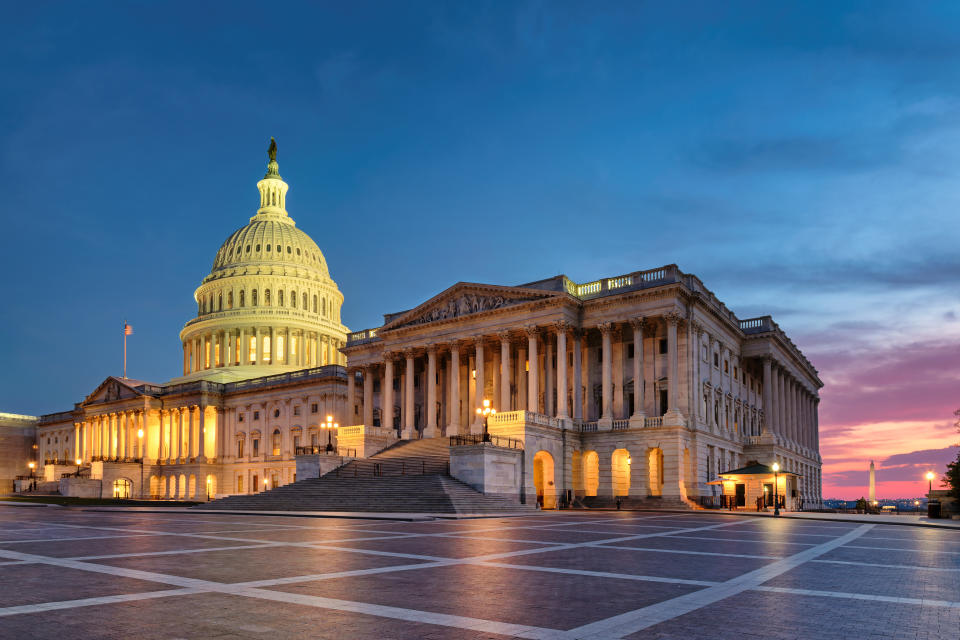Roubini lashes out at post-election gridlock: No stimulus means 'lots of people are going to suffer'
Famed economist Nouriel Roubini warned on Friday that legislative gridlock and an inadequate fiscal stimulus package — at a time when coronavirus cases are climbing — may tip the economy into a double-dip recession.
As of late Friday, former Vice President Joe Biden appeared increasingly likely to prevail in his quest for the White House, with President Donald Trump lagging in both the popular vote and Electoral College numbers as key states finalize ballot counts. Meanwhile, Republicans appear to have an edge on retaining the Senate majority.
Some on Wall Street have suggested Trump and the Senate GOP could hash out a “lame duck” stimulus before the January inauguration.
However, Roubini suggested the incumbent has “no incentive” to relent on Republican demands for a smaller bill — especially if Biden is formally declared the election’s winner.
“Remember, when [former President Barack] Obama came to power during a severe recession, there was not a single Republican who voted for that stimulus. This time around, the Republicans are going to say, 'We're not going to help Biden. Let the economy rot because we are going to have a chance in 2022,’” the New York University economist told Yahoo Finance in a wide-ranging interview.
Roubini — widely known as “Dr. Doom” for his dark prognostications — cast doubt on prospects for bipartisan accord on a fresh injection of cash for the winded economy. He added that any stimulus would need to be "well-above a trillion to make a difference."
In light of that, “we are going to have gridlock like the past — we're not going to have enough fiscal stimulus, the economy is going to weaken, and that's going to be something that eventually is going to bear negatively on the market," he added.
Market defies uncertainty, but lots will ‘suffer’

As investors began to digest the election, the S&P 500 posted its best week since April, largely because Biden’s narrow Democratic majority means less prospect for major tax hikes and expensive government initiatives, if he’s formally declared the winner.
"In the short-run, of course, this week the stock market rallied because they believe that divided government is good and whey they believe the divided government is good is because Biden wanted to increase taxes,” Roubini said.
Those initiatives include hiking corporate taxes from 21 to 28 percent, closing favorable tax loopholes, and raising taxes on those who make more than $400,000, among other things. Those proposals would be anathema to Congressional Republicans, and would come as the economy suffers the after-effects of the COVID-19 crisis.
As the virus spreads, the prospects for the economy look increasingly dim. Roubini estimated that Europe is already going into a double-dip recession in the fourth quarter, and the first quarter of 2021.
"In the United States, even if you don't have Draconian lockdowns like they're going to have in Europe,” surging infections means people and companies “are more risk-averse, more uncertain, they spend less, they save more,” he said. The uncertainty weighs on employment, personal spending and business investment.
In the U.S., without adequate fiscal stimulus, "that could be bearing negatively on the market over time, not in the short-run, but over time once we realize that we have a ‘V’ that becomes more like a ‘U’ with a risk of a double-dip recession," Roubini added, referencing the pace and scope of a recovery.
For now, his baseline is "mediocre, anemic, subpar, below-trend recovery that means lots of people are going to suffer."
While the October jobs report on Friday showed the economy added 638,000 jobs, and the unemployment rate dropped to 6.9% from 7.9% a month ago, 10 million people are still out of work since the beginning of the pandemic.
To be sure, while the economy has improved, for many Americans, it's "not a good economy," the economist said.
One of the challenges out-of-work Americans might face, according to Roubini, is when companies rehire, rather than bringing back full-time jobs with full wages and benefits. Once they do, they'll likely opt for more part-time, freelancer, contractor, and gig workers, with low wages, he estimates.
"The corporate sector wants to have flexibility. That means that these precarious jobs will become the new norm, leading to economic fragilities, more uncertainty, more income and wealth insecurity,” Roubini said.
Julia La Roche is a correspondent for Yahoo Finance. Follow her on Twitter.
Find live stock market quotes and the latest business and finance news
For tutorials and information on investing and trading stocks, check out Cashay
Follow Yahoo Finance on Twitter, Facebook, Instagram, Flipboard, LinkedIn, and reddit.

